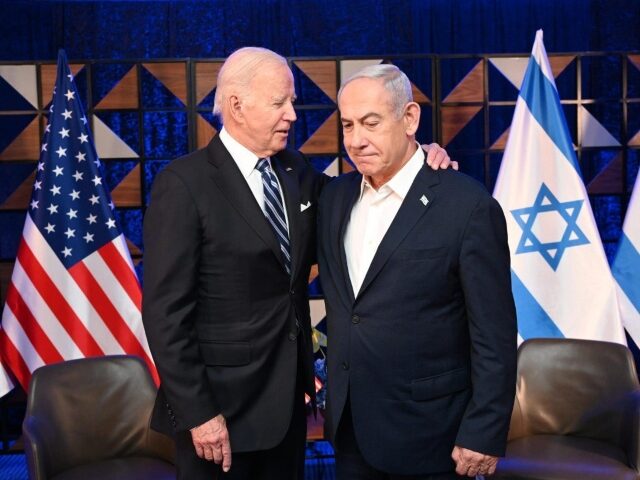President Joe Biden spoke to Israeli Prime Minister Benjamin Netanyahu on Friday, the first conversation between the two since December 23, as the U.S. administration pressures Israel to accept a Palestinian state at the end of the war started by Hamas.
Netanyahu, who had previously — if grudgingly — accepted the idea of a Palestinian state alongside Israel, has steadfastly refused to accept a Palestinian state as a plan for the “day after.”
He is supported by Israelis in that view, 65% of whom now oppose such a state — a complete reversal of public opinion since 2012, when 61% of Israelis supported a Palestinian state. The difference is due to the experience of being attacked by Hamas, which is armed and funded by Iran and has governed Gaza since a coup in 2007.
Biden, like President Barack Obama, has sought to appease Iran through nuclear agreements and the transfer of billions of dollars in cash and assets that the Iranian regime uses to finance its terror proxies around the region and tp repress its own population.
Rather than give up on appeasement — even in the face of escalation by other Iranian-backed proxies, such as Iranian units in Iraq and the Houthis in Yemen — the Biden administration has sought to shift blame for its failing policies onto Netanyahu.
In so doing, the Biden administration also hopes to pacify left-wing Democrats — both in key swing states like Michigan, and within the government. Left-wing staffers, in the White House and in Congress, have openly protested U.S. support for Israel.
The Biden administration has also been accused of working with Netanyahu’s domestic political rivals to destabilize the democratically-elected right-wing coalition he leads. Some of Netanyahu’s opponents are already calling for new elections.
In remarks to the press at a White House briefing on Friday, White House national security spokesman John Kirby said that the call was productive, even though the two leaders had been open about their firm differences over a future Palestinian state.
The previous call in December had reportedly ended abruptly when Netanyahu refused to allow the transfer of tax funds, which Israel collects on behalf of the Palestinian Authority, to the Palestinian government. Israel has agreed to transfer the funds but does not want the Palestinian Authority to send any of the money to Gaza. The Palestinian Authority has refused that condition.
Kirby said that Netanyahu had agreed to move forward on the tax issue, which would be considered soon by the Israeli cabinet.
Asked by reporters whether the U.S. could still work with Netanyahu, given his opposition to a Palestinian state, Kirby said that the U.S. respected the democratic will of the Israeli people and would work with whatever prime minister Israeli voters chose.
Kirby also expressed appreciation for an Israeli decision to allow trucks of flour into the Gaza Strip, and concern over reports that a Palestinian-American teenager had been killed recently in clashes in the West Bank with the Israel Defense Forces (IDF).
Joel B. Pollak is Senior Editor-at-Large at Breitbart News and the host of Breitbart News Sunday on Sirius XM Patriot on Sunday evenings from 7 p.m. to 10 p.m. ET (4 p.m. to 7 p.m. PT). He is the author of the 2021 e-book, “The Zionist Conspiracy (and how to join it),” now updated with a new foreword. He is also the author of the recent e-book, Neither Free nor Fair: The 2020 U.S. Presidential Election. He is a winner of the 2018 Robert Novak Journalism Alumni Fellowship. Follow him on Twitter at @joelpollak.

COMMENTS
Please let us know if you're having issues with commenting.